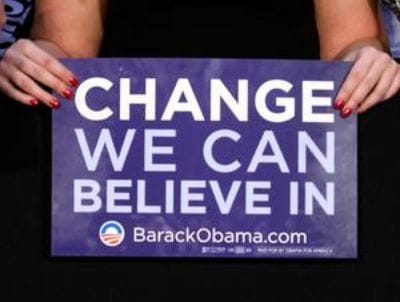<i>Can</i> Obama do it this time?

Photo: AFP
After the slight edge the Republican challenger to the White House, Mitt Romney, has gained among the likely voters in the swing states over the incumbent President Obama at Denver, the upbeat GOP camp is better poised to make new gains in tomorrow's debate in New York.
But why did the incumbent Obama look so listless at the first debate, while his challenger was so confident and clearly in command? Those who closely watched the 2012's US presidential debates in US cannot be greatly surprised at this success of the challenger, since the incumbent cannot be but defensive in such debates -- for he is completely exposed to the challenger in regards to his successes and failures over the last four years' performance in office.
But his challenger has no such stakes, as he has never been the president. What he has are only dream projects and promises about what he might prove once in charge of the presidential office. The present president had also many such visions and dream projects of the future for an audience who were too tired of the wars on terror and Iraq mess-ups of the Bush era.
And the audience is always eager to hear what is new on offer than the jeremiad of what the then-incumbent could do but couldn't and what he had to go through to clear the muddle of the previous government.
But there were still other surprises for Obama at Denver. As he complained after the debate, he did not find the Romney he (Obama) used to know -- a more conservative and aggressive opponent in matters of policies, domestic or foreign. Mitt Romney was less aggressive about his foreign policy pronouncements on Iran, Syria, or the death of US ambassador to Libya and three other diplomats in a terrorist attack in Benghazi.
About issues like abortion, health care, 5 trillion dollar tax cut and so on, he evinced a marked retreat from his usual more combative stances at the meetings with his camp followers and constituents than was seen at the debate.
Without being an apologist for Obama, it can be said that he was least prepared for this other Republican in Romney at the debate table.
Understandably, at the debating grounds the challenger for the White House was and will always be more eager to sound more popular to some 70 million viewers watching the TV show than when pandering to the conservative constituencies in the Republican bastions.
However, the Democrat incumbent should not have been forgetful of his own olive branch of bipartisan call to the Americans, when he was challenging Bush during the campaigns in the run-up to 2008 presidential polls.
Obama was now only busy fact-checking, when his opportunistic opponent was playing the very card that Obama played against Bush in 2006: What a dangerous place the world has become for America and the long list of the then-presidents' failures to more strongly stand by America's friends to fight the foes and so on.
But the truth is, these are cheap allegations every incumbents face and will have to face in the future from his opponents. Obama, with his four years in charge, only knows too well how easily those fault lines in the domestic and foreign policies are pointed at when in opposition than they are fixed when in office.
So the challenger did deliberately make the most of his situation as he has nothing to prove at the moment.
With hardly two weeks to go for the US presidential polls, much will depend on tomorrow's debate results in New York.
Obama should have to be more aggressive at the debate to improve his chances of winning.
Unlike our incumbent prime ministers, or oppositions, who are given to brinkmanship and are even indiscreet in their utterances and actions, be they in office or during electoral campaigns -- where they never bother about any faux pas -- US presidents have to be very discreet at every step.
As he is in office he (Obama) can ill afford to be as adventurous as his rival can. He can at least present himself as someone who is least expected by his rival Mitt Romney at the debating table tomorrow. His vice president Joe Biden might be an example, though many say he (Biden) overdid it with his grins and smirks during the face-off with his conservative rival Paul Ryan, 27 years his junior, at the Norton Center in Danville, Kentucky on October 10. But he (Biden) was certainly calmer and more collected than his usual proneness to making gaffes that his rival was counting on so much to cash in on.
So, if not a clear win, there was at least a tie. That was certainly the saving grace for the president.
Debates apart, odds are still in the incumbent president's favour. Given the history of presidential elections during the last one century, the polls results have overwhelmingly been in favour of the incumbent Democratic president.
And to finish the work that Obama started after assuming presidential office in 2008, he needs another term so as not to leave them unfinished. Usually, American voters consider that in the case of not-so-unpopular presidents. Hopefully, President Obama is not that unpopular.

 For all latest news, follow The Daily Star's Google News channel.
For all latest news, follow The Daily Star's Google News channel. 



Comments